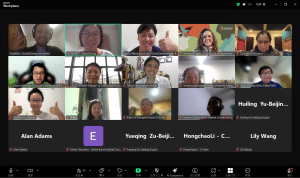On the 4th and 5th of March, thousands of the National People’s Congress (NPC) deputies and Chinese People’s Political Consultative Conference (CPPCC) committee members gathered in Beijing to attend the annual “Two Sessions” to set and endorse the national agenda.
Before the “Two Sessions” kicked off, the Shanda Network and the Phoenix New Media Charity Channel interviewed some of the NPC and CPPCC committee members and reported proposals they made to contribute to the central government’s priorities and plans for the coming years relevant to the Chinese NGO and charity sector.
Zhai Mekqing, member of the National Committee of the CPPCC and President of the Hong Kong Group, said the credibility of the charity sector needs to be boosted. Zhai expressed the credibility of the charity sector directly affects businesses’ and people’s enthusiasm to participate in charitable activities. Despite the enactment of the Charity Law, the public confidence in the charity sector remains low. Zhai recommended that the transparency of the sector needs to be further improved, which requires more comprehensive laws and regulations to fill the existing policy gaps. Effective assessment systems to measure organisational transparency are equally needed. In addition, the public should be be encouraged to both participate in charitable activities and play an active role in supervising charitable organisations’ work.
The proposal of Lai Xiufu, representative of the NPC and director of the Trust Supervision Department of the China Banking and Insurance Regulatory Commission, focuses on addressing issues of charitable trusts in China. Since 2017, rapid development of charitable trusts in China has taken place. Charitable trusts and charitable have similar functions, yet the former does not enjoy the same tax incentives as the latter. Lai pointed out that the lack of tax incentives has become an important constraint on the development of charitable trusts. He recommended giving priority to the implementation of tax incentives for charitable trusts, improving the preferential tax policies for charitable trusts with various non-monetary properties, clarifying unclear definition in the existing laws and regulations regarding tax incentives, such as the Implementation Measures for the Pilot Reform of Business Tax to Value-Added Tax, and gradually implementing the preferential tax policies for operations and expenditures of charitable trusts.
The Phoenix New Media Charity Channel paid attention to voices of the NPC deputies and CPPCC members on prevention of minors’ sexual assault. They reported proposals in the following aspects:
- Prevention of children’s sexual assault, child trafficking and child abuse must be included in the curriculum within the nine-year compulsory education system;
- Children should be told to claim their rights in time when their rights are violated;
- Harsher penalties must be imposed on perpetrators, and a mandatory system reporting the assaulting of children must be set up;
- Damages for mental anguish in victimised children should be claimed in the scope of compensation;
- A corresponding educating and counselling mechanism for minors’ parents must be established.



